Turning scrap into small, mobile tractors has been a game-changer for King Tractors.
King Tractor is on a mission to make it affordable for Ghana’s farmers to have access to the sort of equipment that previously they might have found too expensive to buy. “If you look at the price to buy a traditional tractor, it’s around one million Ghanaian Cedis (around $88,000), but when King Tractor makes one, it costs us just 35,000 Cedis to make,” explains Eric Kuupole, one of the four co-founders of King Tractor back in 2022. Their secret to making their tractors affordable is something that is not only good for the bank balance of the farmers they support, but for the planet too.
“Our tractors are basically made out of scraps of vehicles that are abandoned, that people are not using for anything. So, we use those scraps, put them together to build the machine. And I tell you that they are strong! They can do every type of work that a normal tractor can do. We actually want to change that narrative where people are having the view that these scraps are just of no use. The other advantage is that we can make the tractors much lighter – that’s important for the soil because if you have a tractor that is very heavy, it disturbs the topsoil too much and the seed is planted too deep and cannot access the nutrients, so you get more crop failure.”
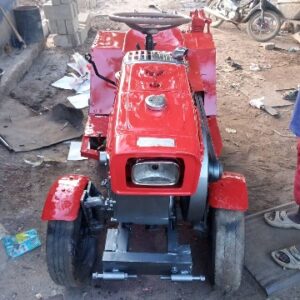

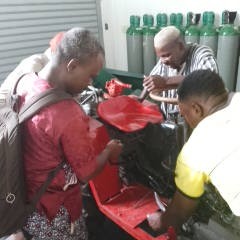
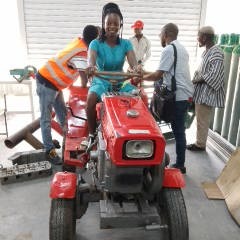
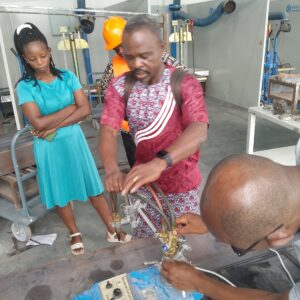
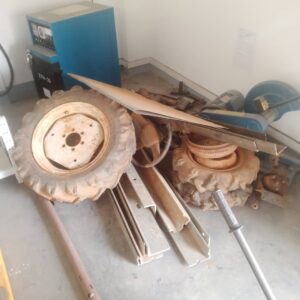
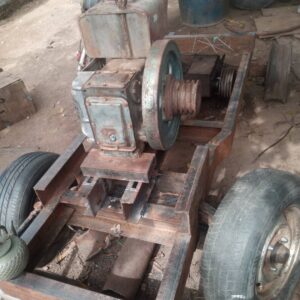
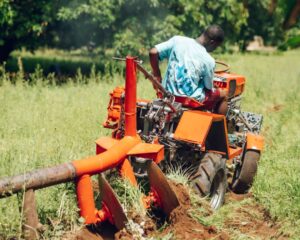
King Tractor’s Financial Director, Kuole Agnes, explains that the idea grew out of the Kosmos Innovation Center that they attended. “I first heard about Kosmos Innovation Center when I saw a flyer. The flyer said that an organization was going to sponsor young people who are interested in agriculture business. If you have any innovative idea, you can apply. So, I applied and within a few weeks, I was being called for an interview, and from there I was selected. I really enjoyed it a lot. I had this mindset of developing my own business, and my major goal was to end up running my own company, but I didn’t know much about how to go about it until I joined Kosmos Innovation Center.”
King Tractor has grown from the simple aim of bringing tractors to the people and now employs a further seven people, aside from the four co-founders. For Kuole, the whole experience is challenging, but she says the real joy is seeing their work impacting the farmers. “When we won the money at the end of the Kosmos Innovation Center process, I was in heaven. I was in paradise. I can’t speak for my colleagues, but I was so, so, so excited also because the competition was high. Now we are very happy to see our tractors out there and happy to see our idea work.”
With 6.8 million women employed in Ghana, compared to 7.4 million men, it’s clear that Ghana still has some way to go to address the discrepancy in the gender employment gap. This is especially telling when you realize that women in Ghana earn on average 34% less than men, according to Stats Ghana. For Kuole, the experience of going through the KIC program has left her as a passionate advocate for promoting the opportunity. She regularly posts about the Kosmos Innovation Centre scheme on her social media, which has led to girls contacting her to find out more about what the opportunity involves and if it’s for them.
“In the future, I see that women will not be left out or will not be treated as they were treated in the olden days in Ghana because there are programs like Kosmos Innovation Center, and there are organizations that are enlightening women to see that they are really important in society and they should stand up for themselves. I can see most women standing for themselves. So, in the future, if such things continue, there will be a gender balance. Everything won’t be only men, men, men. Women should also be counted.”
Regardless of the barriers that gender might represent, it is ultimately the hope of building the tractors from scrap that drives Kuole and Eric forward as a company. The parts for their machines come from abandoned cars and tricycles, with the only parts being bought in are the engines of the machines. This means that they can build tractors which can reach parts of Ghana that normal tractors can’t. “Usually people had to wait for someone to come down and do ploughing for them, or they would do it by hand,” Kuole explains. “That means that the cost is high, or even sometimes that you cannot get one and you might lose your crop. So, when we brought King Tractors to them and they saw that they could access the land and wouldn’t destroy it with heavy machines, they were so happy.”
